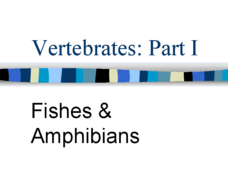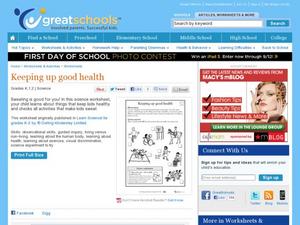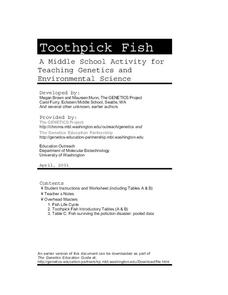Curated OER
F.B.I.
Learners create a worm bin full of fruit and vegetable scraps wit paper and observe what happens over time. For this decomposers lesson plan, students observe that the fruit and vegetable scraps become new soil.
Curated OER
Researching and gathering information
Though text heavy, these nine slides present clear instructions for each stage of the research method that students should use to organize information about Saguaro Cacti. A good introduction to organizing research for a writing...
Curated OER
Prokaryotes
Although these slides are text rich, the summaries of prokaryote characteristics will be useful. There are diagrams of preferred cell conditions and your students will find all the basic definitions of structure and functions useful. ...
Curated OER
Phylum mollusca
This is an organized presentation that lists characteristics and features of their general body features. Mollusc is spelt with both a 'c' and a 'k' in various stages of this Powerpoint so an explanation by the teacher of Scientific...
Curated OER
Wildlife Conservation III
Discuss the importance of wildlife conservation. Learners talk about the animals and plants on the US Fish and Wildlife Services list of endangered and threatened species. Then, they engage in a detailed discussion of the reasons these...
Curated OER
Mitosis and the Cell Cycle
Uncomplicated and useful, this PowerPoint introduces viewers to the five stages of mitosis. For each stage, there is a slide that lists the main occurrences. Show this as a note-taking guide when you lecture on mitosis to keep your young...
Curated OER
Vertebrates: Part I, Fishes & Amphibians
A simple set of slides shares the three classes of fish and the class amphibia. The first three slides cover fish characteristics and structure, while the last three cover amphibian characteristics and life cycle. Though somewhat...
Curated OER
Wildlife Burrows
Burrowing animals are busy! Get your middle school ecologists busy as well by having them create a scale model of a burrowing population. They also design a PowerPoint or poster to explain their models.
Curated OER
High Wire Magazine: Turning Points
Develop and strengthen reading comprehension strategies through this comprehensive teaching guide. Your learners will practice making text connections, inferences, predictions, and more using reading passages from the teen-appropriate...
Curated OER
Keeping Up Good Health
During a discussion on sweating with your little ones, this resource should come in handy. Little learners place a check mark next to an activity pictured on the worksheet that would induce sweating. There are seven pictures to choose...
Alabama Learning Exchange
Nature's Life Cycle
Become a member of the Pollution Patrol and stand up to litter! After discussing the life cycle of seeds and discussing how plants figure into the food chain, young conservationists engage in several activities involving podcasts,...
Curated OER
Genetics and Genetic Engineering
Pretty purple slides present a plethora of jargon related to genetic engineering. Most of them have one term across the top and a brief explanation of that term below. They are arranged in alphabetical order, which may not be the most...
Curated OER
A Safe Food Supply? Is Your Food Safe to Eat?
Viewers of this slide show learn that pesticides used on food crops can be harmful, but that there are certain allowable levels that should not be hazardous. They find out the rigorous process of inspection that meat must go through...
W.K. Kellogg Biological Station
Succession: Patterns in the Field and in Seeds
Have you been wondering how to use that natural trail at or near your school? This activity gets kids outside with a purpose: learn about ecological succession through field observations and collecting seed and soil samples. The resource...
Curated OER
Meiosis Starts With?
How do you fill in the blanks about meiosis? With this handout! Most of the blanks have a letter filled in to give learners a hint. This resource is a good way for young biologists to ensure they have learned all the necessary vocabulary...
Curated OER
Chapter Seven: Cell People and More Notes
Who were the key players in cell theory? Use a handout to help young biologists record the basics about cell theorists and cell types. It refers to chapter seven of a textbook, but does not include the name of the textbook.
Curated OER
Trigonometry Worksheet 9
Learners use addition and subtraction formulas and special reference triangles to solve a variety of trigonometric problems. Sine, cosine, and tangent problems in both radians and degrees are included.
Curated OER
"Keep Calm Parody"
With a computer and some creative thinking, young graphic designers learn the basics about clip art and inserting images to create a parody poster. They watch a video that discusses the story behind the "Keep Calm and Carry On" poster,...
Wordpress
Art Integration “Message Making”
Young adults convey a message about a chosen health issue through research and poster production. This creative assignment could be an inspirational close to a health unit.
University of Washington
Toothpick Fish
With colored toothpicks representing genes, youngsters practice passing them through generations of fish and learn about heredity. Consider this as an introductory activity since it does not represent recessive genes with lowercase...
MENSA Education & Research Foundation
Roller Coaster Mania!
Raise the energy level of your physical science class with this exciting hands-on activity. Applying their knowledge of kinetic and potential energy and Newton's laws of motion, young engineers use foam tubing and marbles to create...
Wind Wise Education
Understanding Electric Power Generation
You mean the electricity does not come from the switch? As a class and in small groups, learners explore the sources of energy used to generate electric power. Worksheets guide groups into choosing a future electricity generating...
Wind Wise Education
Can Wind Power Your Classroom?
Can you power this? Individuals do an energy audit for the classroom to determine the amount of electricity needed to power it. Using either live data or sample data from wind turbines they decide whether it would power the classroom....
WindWise Education
What Factors Influence Offshore Wind?
What is that out in the water on the horizon? Teams work together to study the coastline using maps to determine the best and worst locations to place an offshore wind farm. The teams then build a scale model wind farm to see what it...
Other popular searches
- Cell Reproduction
- Asexual Reproduction
- Sexual Reproduction
- Plant Reproduction
- Human Reproduction
- Flower Reproduction
- Animal Reproduction
- Heredity and Reproduction
- Sexual Asexual Reproduction
- Cell Reproduction Crossword
- Human Sexual Reproduction
- Cellular Reproduction

























